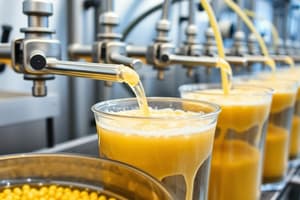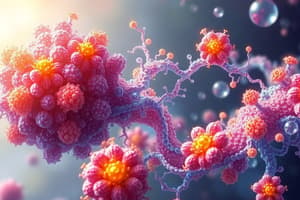Podcast
Questions and Answers
What are primary metabolites primarily associated with?
What are primary metabolites primarily associated with?
Which of the following is NOT classified as a secondary metabolite?
Which of the following is NOT classified as a secondary metabolite?
During which phase are secondary metabolites primarily produced?
During which phase are secondary metabolites primarily produced?
Which of the following products is considered a primary metabolite?
Which of the following products is considered a primary metabolite?
Signup and view all the answers
What is the term for the phase where microorganisms produce primary metabolites?
What is the term for the phase where microorganisms produce primary metabolites?
Signup and view all the answers
Which type of product includes enzymes associated with microbial cells?
Which type of product includes enzymes associated with microbial cells?
Signup and view all the answers
Which statement about secondary metabolites is true?
Which statement about secondary metabolites is true?
Signup and view all the answers
What types of products can microorganisms produce in industrial microbiology?
What types of products can microorganisms produce in industrial microbiology?
Signup and view all the answers
What are primary metabolites primarily synthesized during?
What are primary metabolites primarily synthesized during?
Signup and view all the answers
Which of the following is NOT considered a primary metabolite?
Which of the following is NOT considered a primary metabolite?
Signup and view all the answers
Why are microbial fermentations economically competitive for producing primary metabolites?
Why are microbial fermentations economically competitive for producing primary metabolites?
Signup and view all the answers
What aspect of microbial metabolism ensures it does not overproduce compounds?
What aspect of microbial metabolism ensures it does not overproduce compounds?
Signup and view all the answers
During which phase of cell growth does the accumulation of secondary metabolites typically lag?
During which phase of cell growth does the accumulation of secondary metabolites typically lag?
Signup and view all the answers
What is a common limitation related to the optimal growth conditions for microbial synthesis of secondary metabolites?
What is a common limitation related to the optimal growth conditions for microbial synthesis of secondary metabolites?
Signup and view all the answers
Which compound is categorized as a primary metabolite of catabolic metabolism?
Which compound is categorized as a primary metabolite of catabolic metabolism?
Signup and view all the answers
What factor has increased interest in microbial production of certain compounds recently?
What factor has increased interest in microbial production of certain compounds recently?
Signup and view all the answers
What is the primary mechanism responsible for the regulation of anabolic enzymes in biosynthesis?
What is the primary mechanism responsible for the regulation of anabolic enzymes in biosynthesis?
Signup and view all the answers
How does feedback inhibition primarily work in metabolic pathways?
How does feedback inhibition primarily work in metabolic pathways?
Signup and view all the answers
What is the role of the end product in feedback repression?
What is the role of the end product in feedback repression?
Signup and view all the answers
Which form of regulation acts rapidly to switch off the biosynthesis of an end product?
Which form of regulation acts rapidly to switch off the biosynthesis of an end product?
Signup and view all the answers
In linear pathways producing a single end product, which action is typically observed?
In linear pathways producing a single end product, which action is typically observed?
Signup and view all the answers
What happens to the apo-repressor in the presence of its co-repressor?
What happens to the apo-repressor in the presence of its co-repressor?
Signup and view all the answers
Which type of metabolic pathways involves more complex control mechanisms?
Which type of metabolic pathways involves more complex control mechanisms?
Signup and view all the answers
What is one of the outcomes of feedback regulation in metabolic processes?
What is one of the outcomes of feedback regulation in metabolic processes?
Signup and view all the answers
What type of feedback control involves more than one end product exerting control over the first enzyme?
What type of feedback control involves more than one end product exerting control over the first enzyme?
Signup and view all the answers
In which feedback control mechanism do end products inhibit the first enzyme to a certain percentage independently?
In which feedback control mechanism do end products inhibit the first enzyme to a certain percentage independently?
Signup and view all the answers
Which feedback control mechanism ensures that control occurs immediately after the branch point to an end product when that product is in excess?
Which feedback control mechanism ensures that control occurs immediately after the branch point to an end product when that product is in excess?
Signup and view all the answers
What is the role of isoenzymes in metabolic control?
What is the role of isoenzymes in metabolic control?
Signup and view all the answers
What is the ideal characteristic of an industrial microorganism's metabolism in relation to the product of interest?
What is the ideal characteristic of an industrial microorganism's metabolism in relation to the product of interest?
Signup and view all the answers
Which of the following statements is true regarding cooperative feedback control?
Which of the following statements is true regarding cooperative feedback control?
Signup and view all the answers
How are modifications in industrial microorganisms typically achieved for strain improvements?
How are modifications in industrial microorganisms typically achieved for strain improvements?
Signup and view all the answers
Which of the following describes the consequence of an organism not recognizing inhibiting levels of normal control metabolites?
Which of the following describes the consequence of an organism not recognizing inhibiting levels of normal control metabolites?
Signup and view all the answers
What is the primary goal of intensive mutagenesis followed by screening and selection in industrial production?
What is the primary goal of intensive mutagenesis followed by screening and selection in industrial production?
Signup and view all the answers
How can gene overexpression enhance a metabolic pathway?
How can gene overexpression enhance a metabolic pathway?
Signup and view all the answers
What role do auxotrophic mutants play in the production of primary metabolites?
What role do auxotrophic mutants play in the production of primary metabolites?
Signup and view all the answers
What happens to the metabolic pathway control when biotin levels are insufficient in Corynebacterium glutamicum?
What happens to the metabolic pathway control when biotin levels are insufficient in Corynebacterium glutamicum?
Signup and view all the answers
Which of the following contributes to increased permeability in biotin-limited cells?
Which of the following contributes to increased permeability in biotin-limited cells?
Signup and view all the answers
What is a likely consequence of adding penicillin during biotin limitation?
What is a likely consequence of adding penicillin during biotin limitation?
Signup and view all the answers
What effect does feedback inhibition have in metabolic pathways?
What effect does feedback inhibition have in metabolic pathways?
Signup and view all the answers
Why would a glycerol requiring auxotrophic mutant excrete glutamate?
Why would a glycerol requiring auxotrophic mutant excrete glutamate?
Signup and view all the answers
Study Notes
Introduction to Industrial Microbiology
- Industrial microbiology is the study of microorganisms used to produce various compounds and transform substrates.
- Microbial products are classified as primary and secondary metabolites.
- Primary metabolites are compounds related to the synthesis of microbial cells and are formed during the growth phase (trophophase).
- Examples of primary metabolites include amino acids, nucleotides, ethanol, and organic acids.
- Secondary metabolites accumulate after the active growth phase (idiophase) and are not directly related to cell synthesis.
- Examples of secondary metabolites include antibiotics and mycotoxins.
Microbial Synthesis of Primary Metabolites
- Primary metabolites are produced during the exponential growth phase of microorganisms.
- These metabolites include intermediates and end products of anabolic and catabolic metabolism.
- Key primary metabolites for industrial use include amino acids, nucleotides, vitamins, solvents, and organic acids.
- Microbial fermentations are often economically competitive for producing primary metabolites compared to chemical synthesis.
Control of Primary Metabolism
- Microbial metabolism is a conservative process that avoids wasteful production of compounds.
- Regulatory control mechanisms ensure efficient production of enzymes and metabolites, such as feedback inhibition and covalent modifications.
- Feedback regulation involves the end product of a pathway inhibiting the first enzyme of the pathway, either at the enzyme level (feedback inhibition) or the synthesis level (feedback repression).
- Feedback inhibition is a rapid control mechanism that switches off the biosynthesis of an end product.
- Feedback repression switches off the synthesis of redundant enzymes.
- Branched pathways are controlled by various mechanisms, including concerted/multivalent feedback control, cooperative feedback control, cumulative feedback control, sequential feedback control, and isoenzyme control.
Approaches to Strain Improvements
- Ideal industrial microorganisms require deregulation of their metabolism to produce high yields of desired products.
- The enhancement of a metabolic path can be achieved by gene overexpression through point mutations in promoter regions or increased copy number of genes.
- Prevention of byproducts can be achieved by searching for auxotrophic mutants.
Modification of Permeability
- An example of permeability modification is seen in the glutamic acid fermentation by Corynebacterium glutamicum.
- Biotin levels influence glutamate excretion, with low levels leading to glutamate excretion and high levels leading to lactate production.
- This permeability change is linked to alterations in the fatty acid and phospholipid content of the cell envelope.
- The inclusion of penicillin or fatty acid derivatives during exponential growth under biotin limitation also causes glutamate excretion.
- Auxotrophic mutants requiring glycerol for phospholipid synthesis can also lead to glutamate excretion.
Studying That Suits You
Use AI to generate personalized quizzes and flashcards to suit your learning preferences.
Related Documents
Description
This quiz explores the fundamentals of industrial microbiology, focusing on the production of primary and secondary metabolites by microorganisms. Key concepts include the growth phases of microorganisms and their contributions to industrial processes through various microbial products. Test your knowledge on essential metabolites and their applications.




